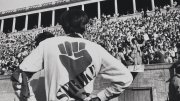Michael Ansara ’68 cut his teeth in the civil rights movement and was a leader in the Harvard chapter of Students for a Democratic Society as well as a New England SDS organizer. As an alumnus, he returned to campus during the spring 1969 upheavals (the University Hall occupation, the strikers’ removal by the state police, and the ensuing chaos) as chair of the strike committee. He still burns for the causes of his youth—all the more so given his take on the United States today—but has put matters in perspective in The Hard Work of Hope: A Memoir (Cornell, $23.95 paper). While encouraging today’s activists and organizers, Ansara leavens his tale with lessons learned, summarized in the epilogue, “From the Vantage of Fifty Years,” excerpted here:
With all the benefits of hindsight, would I try again to create opposition to [the] war [in Vietnam]? Absolutely! But I hope we would be smarter and better. There is no question that our movement against the war mattered. It was a critical factor in driving Lyndon B. Johnson to reject his generals’ request for more troops, not to run again, and to start peace negotiations.…While we made mistakes, our efforts mattered.
The war destroyed so much. In that long list of losses, I count our original vision of a New Left, our political innovation, and our innocence. The politics of our country became distorted and fractured. In so many ways, in the admirable effort to end that war, we lost much of what was best in ourselves.
In a short time, we…went from a tiny band of the scorned to leaders of demonstrations of hundreds of thousands. We saw the war escalate and escalate, witnessed violence unceasing and unimaginable, and it felt as if we were the only ones there to stop it. We became the leaders of a massive youth insurrection at a time when all around the world, young people were shaking the foundations of society.…That youth gave us our energy, our passion, and our ability to think in new ways. But it also meant we lacked a grasp of strategy and a mature understanding of how to succeed at the enormously difficult tasks we set for ourselves.…
Too many New Left leaders careened off the tracks of reality. I saw talented, brilliant friends…fall into a parody of all that they had rejected. Our intellectual journey had been launched by…exploring American moral traditions, looking for new ways of extending and reinvigorating democracy. By 1969 too often that journey descended into deranged dogmas, secular cults, and a glorification of violence.…
Still there could have been a more serious, intellectually rigorous, politically relevant resistance.…
It is not easy to marry the just demands for racial and gender equity with a populism that embraces those left behind and left out. Not easy, but it is possible.…
Despite the profound changes of the last fifty years, I see some of the same dynamics as when I was young. A small group of old white men clinging desperately to power. The…failure of the country to face up to the systems of racism that have settled bone deep in the land. And young people whose futures are at stake. Young people who want to live lives that have meaning and value, who want to be able to have a stake in shaping the decisions that will determine their lives.








